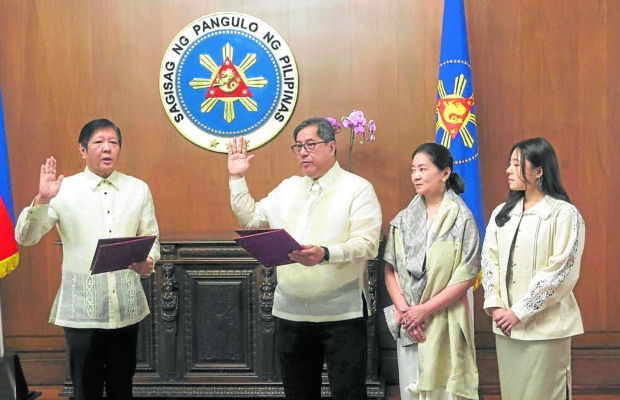Unpaid DOH benefits top new chief’s agenda

OATHTAKING | President Marcos Jr. administers the oath of newly appointed Health Secretary Teodoro Herbosa in Malacañang Palace on Tuesday, June 6, 2023. (POOL PHOTO)
MANILA, Philippines — Newly appointed Health Secretary Ted Herbosa has vowed to make the distribution of delayed COVID-19 benefits to healthcare workers a priority under his leadership.
Herbosa, who previously served as health undersecretary under the Aquino administration, said that he would order both the Department of Health (DOH) and the Department of Budget and Management (DBM) to look for funding sources and distribute the arrears to healthcare workers.
“It’s about time we honor them because they’re leaving [the Philippines]. They’re getting jobs in other countries that [pay] them higher. We need to solve this. This is my priority,” Herbosa told reporters on Wednesday at the DOH headquarters, two days after he was sworn in.
“I’ll look into that, make sure that all those who worked and rendered service receive their benefits,” he said.
Health benefits
Some 20,000 healthcare workers who attended to COVID-19 cases at the height of the pandemic have yet to get the benefits promised to them. So far, the total amount owed by the government has ballooned to P1,840,742,500, the United Private Hospital Unions of the Philippines said in April. This included P6.7 million for meal, accommodation, and transportation benefits; P16.8 million for special risk allowance; P985.6 million for One COVID-19 Allowance, and P737.5 million for Health emergency allowance.
Article continues after this advertisementAside from addressing the plight of healthcare workers, Herbosa said that the President’s marching orders to him were to address the rising cases of human immunodeficiency virus, teenage pregnancy, and tuberculosis.
Article continues after this advertisementHe was also directed to further widen healthcare access to indigents through the establishment of specialty hospitals.
“I just hope the DOH will all help me… [in] fully implementing universal health care,” he said.
Universal healthcare law
Responding to his critics, Herbosa denied being an advocate for the privatization of government hospitals. What he plans to look into, he clarified, is how the government can tap the private healthcare sector for the full realization of the universal healthcare law.
“I will probably meet the private sector sometime next week or in a few weeks, if they are ready, to discuss what they could contribute to the implementation of universal health care,” said Herbosa. “They are the ones with excess capacity, but not all Filipinos could afford them.”
Health Undersecretary Maria Rosario Vergeire, a longtime career official, led the DOH when it remained headless for nearly a year since President Marcos assumed office.
Asked about Vergeire’s new role at the DOH following his appointment, Herbosa said that she would soon make an announcement as she “has already verbalized what she wishes to do.”